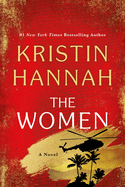
A bright young nurse enlists in the United States armed forces during the Vietnam War with the hope of making a difference, and faces the horrors of war and the turmoil of returning home in The Women, an epic, yet intimate, and heart-wrenching historical fiction saga by Kristin Hannah (The Four Winds). Through meticulous research and intricate character development, Hannah resurrects the voices of war's overlooked heroes: the women.
Twenty-year-old Frances "Frankie" McGrath has grown up with all the advantages her father, a California real estate developer, can afford. Her upbringing and parochial school education have "instilled in her a rigorous sense of propriety," and her mother urges her to slow down at nursing school and focus on finding a husband. The social unrest in the United States in 1966 seems far from her sheltered life, as does armed conflict in Vietnam. Her father has raised Frankie and her older brother, Finley, on stories of their family's military service and keeps a "wall of heroes" with photos of male relatives in uniform, though he himself was unable to serve. When Finley ships out for Vietnam with the Navy, Frankie feels left behind until Finley's best friend Rye makes an astonishing pronouncement: "Women can be heroes." When she realizes nurses can serve in the military, Frankie races to enlist, too. She hopes she and Finley might serve together, but her plan hits a snag: the Navy won't take a nurse without hospital experience. So Frankie signs on with the Army, too naive to understand the implication of its readiness to accept her--they are desperate, being on the front lines. She's shocked when her parents find her enlistment embarrassing and foolish. "It is not patriotic to do something stupid, Frances," her mother says. Then two naval officers come to their house bearing news of Finley's death in action. Frankie's family is broken by the tragedy, and for the first time, Frankie understands the danger in her choices.
Arrival in Vietnam gives Frankie a quick series of rude awakenings. Her plane draws gunfire, she unwittingly drinks unsafe tap water, and she must jump from a hovering helicopter while wearing regulation Army pumps and an excruciatingly uncomfortable panty girdle. A mass casualty event shortly after her arrival at her assigned evac hospital plunges her into a nightmare of blood, chaos, and destroyed young men. The wounded pour into the ER and are sorted by whether or not medical help can save their lives. As she adjusts to life "in country," she is supported by fellow nurses Ethel, a horse-loving Virginian, and Barb, an African American from the Deep South. Frankie sees life and death up close as she tends to soldiers and Vietnamese villagers. Updates from the home front come in letters from her mother, who complains of the protests brought on by the civil rights and anti-war movements and warns her daughter, "The world changes for men, Frances. For women it stays pretty much the same."
Until her homegoing in 1969, Frankie grows as a nurse and as an independent woman, strengthening lifelong friendships, and falling in life-changing love. War may be hell, but what she finds when she returns home is no paradise, either: a country furious about the Vietnam War and taking out its anger on veterans; a family that wants to pretend she never went to war; and hospitals that don't consider her work experience valid. Adrift and struggling with the aftermath of her experiences, Frankie is left wondering why her service to her country is treated like a mark of shame at best, and a lie at worst, and how she can ever move forward.
Frankie begins the story as crisp and clean as a fresh sheet of paper, but her innocence is quickly smudged, creased, and ripped until she crumples. Hannah shows readers that even if a crushed page can never be fully cleaned or smoothed, it still has space to hold a beautiful story. Like the real women who served as nurses in Vietnam, Frankie comes home to a lack of support and recognition. Even when she reaches out for help, she is told to forget the war or, amazingly, that no women served in it. This erasure of her work and sacrifice will likely elicit gut-wrenching anger and pity from readers, but Frankie is fortified by the power of enduring female friendships. The turbulent late 1960s and disillusioned early 1970s serve as a rich backdrop for her personal story, and Hannah works in an enormous amount of atmospheric detail, pop culture references, and historical fact without ever turning the novel into a civics course.
Through the lens of Frankie's point of view, Hannah sensitively reckons with the tangle of horrors and heroism attached to one of the United States' most controversial military conflicts. Book clubs, fans of epic stories with deep character work, and anyone curious about the vital, often ignored contributions of women in war will fall in love with The Women. --Jaclyn Fulwood

